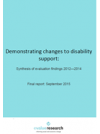This is a final report that brings together the evaluation findings about the individual components of the Demonstration of the New Model for Supporting Disabled People (2012, 2013, 2014, 2015) and examines them in light of the New Model’s strategic intent. That is, to increase choice and control for disabled people over the support they receive to enable them to live an everyday life.
The core components of the New Model are Local Area Coordination (LAC), Enhanced Individualised Funding (EIF), Choices in Community Living (CiCL) and Supported Self-Assessment.
The report provides a summary and synthesis of the findings from the three-year demonstration project.
It identifies the New Model as the beginning of a change to disability supports in New Zealand and acknowledges the importance of this continuing to be sustained.
Although most components were still in early stages of implementation, the benefits for disabled people and their whānau were apparent such as:
- increased independence and self-confidence
- better decision making
- changes in family dynamics and relationships.
Some potential benefits were still unknown due to components being unable to be fully tested within a whole of system change.
The evaluation was conducted in 2015 by Evalue Research. The team interviewed 126 disabled people and whānau about their experiences with the New Model. There were interviews with a wide range of stakeholders involved with the demonstration project and who provided support or services for disabled people. There were also a literature review, document reviews and analysis of administration data from the New Model.

